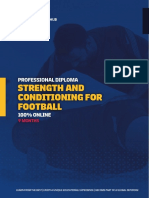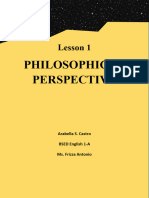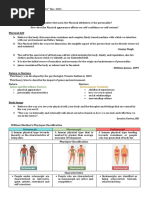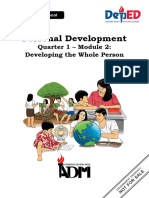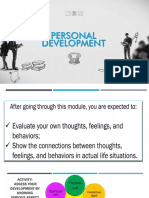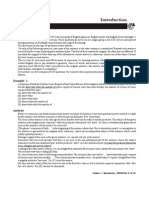Module 4
Module 4
Uploaded by
Engelbert RespuestoCopyright:
Available Formats
Module 4
Module 4
Uploaded by
Engelbert RespuestoOriginal Description:
Copyright
Available Formats
Share this document
Did you find this document useful?
Is this content inappropriate?
Copyright:
Available Formats
Module 4
Module 4
Uploaded by
Engelbert RespuestoCopyright:
Available Formats
TASK NO.
2:
WHAT DOES HE SAY?
Directions: Fill in the appropriate key terms to complete the diagram below. Then using the guide questions below, discuss your diagram and make
a video to be posted in our e-classroom.
William James considered body as the initial source of sensation
and necessary for the origin and maintenance of personality.
Sigmund Freud's construction of self and personality makes the
physical body the core of human experience.
Reich argued that mind and body are one; all psychological
processes, he postulated, are a part of physical processes, and
vice versa.
Erikson defines identity as a “fundamental organizing principal which
develops constantly throughout the lifespan.”
Jung argued that physical processes are relevant to us only to the
extent they are represented in the psyche.
Physical Self refers to the body, this marvelous container and complex, finely
tuned, machine with which we interface with our environment and fellow beings.
People with inflated self-esteem tend to think of themselves as better than other
people and are always ready to underestimate others.
High self-esteem means generally holding yourself in positive regard.
Low self-esteem is when someone lacks confidence about who they are and
what they can do.
1. What is physical self?
Physical self-concept is the individual’s perception of themselves in areas of physical ability and appearance. Physical ability includes
concepts such as physical strength and endurance, while appearance refers to attractiveness and body image.
2. Explain the three types of self-esteem.
INFLATED SELF-ESTEEM: People with inflated self-esteem tend to think of themselves as better than other people and are always ready
to underestimate others. This is actually a very negative type of self-esteem because it prevents people who have it from forming meaningful
and healthy relationships. HIGH SELF-ESTEEM: People who have high self-esteem tend to love and accept themselves. They believe in
themselves and their abilities. They have the confidence that whatever challenges might come, they will be able to surpass it. Some of the
benefits of high self-esteem includes being able to be yourself without the fear of being judged, readiness to accept new challenges, not
always searching for approval from other people, readiness to learn new things as you accept that you do not know everything and also take
corrective criticism. LOW SELF-ESTEEM: People who have low self esteem, think of themselves as below average. They do not believe in
themselves, they do not trust in their abilities and they do not place value on themselves. Low self-esteem can affect a lot of things in one’s
life. Some of the effects of low self-esteem are poor relationships, addiction, depression and anxiety.
GEC US Understanding the Self Page 2
Performance
TASK NO.3:
A. Case Scenario
Kate is 21 years of age and has struggled with her weight all her life. She remembers back in primary school how the kids used to call her “fatty” and
would not want to play with her. The taunting continued throughout high school however it was more subtle. Kate found it difficult to make friends and
often found herself excluded from social events.
Although Kate’s mother is very supportive, the put downs continued at home. Kate’s father would say things like “why
don’t you go on a diet” or “what are you eating that for it’s only going to make you fatter”. Her elder brother was embarrassed to be seen with her and
to make things worse, he was quite athletic.
A few months back, things were starting to turn around for Kate. She began a relationship with a man (Mark), started
exercising and lost about 10 kilograms. Slowly she started feeling better about herself, however the relationship didn’t last and consequently Kate’s
self-esteem is now at its lowest. She blames herself for the break-up and believes that her boyfriend ended the relationship because she’s fat.
However, when questioned further about this Kate could not recall a time when Mark had ever criticized her appearance, in fact he seemed to be
very supportive.
At the moment Kate has such low self-esteem that she doesn’t even want to try to find a job, she thinks “who is ever going to hire me”. Kate
also described how her friends have stopped calling her because they say she is constantly criticizing them. Kate stays at home all day and every
time she looks in the mirror she thinks how ugly she is. It is important to note that Kate is currently within the healthy weight range for her age and
height.
GUIDE Questions:
1. What do you think influence Kate’s low self-esteem?
Body shaming
2. If you are Kate’s friend, how will you help her? What does she need to do in order to overcome her low self-esteem?
If I were Kate’s friend ,I will help her overcome her low self – esteem by advising her that we are all unique and we are capable of life
and I will tell her that she should accept her flaws so that I others will. And its your life Kate , your life your choice don’t mind the
people who just do gossip and criticize you .
3. How important it is for Kate to overcome her low self-esteem?
It is very important for Kate to overcome her low self- esteem so that she can enjoy life and discover more of beautiful things.
Performance
TASK NO. 3:
Identify what is being asked in each statement below. Write your answer before each number.
Puberty 1. It is the stage of development when individuals become sexually mature.
Erogenous zones 2. These areas of the body are highly sensitive to stimuli and are often sexually
exciting.
The sexual 3. It refers to the sequence of physical and emotional occurrences when the
response cycle person is participating in a sexually stimulating activity.
Hypothalamus 4. It is the most important part of the brain for sexual functioning.
Oxytocin 5. It is also known as the “love hormone” and believed to be involved in our
desire to maintain close relationships.
Stage 4 6. This is a stage that involves the desire to have lasting commitment with your
significant other.
Sexual Orientation 7. It is a person’s emotional and erotic attraction toward another individual.
Gender identity 8. It refers to one’s sense of being male or female.
Natural family 9. This is a method which uses the body’s natural physiological changes and
planning (NFP) symptoms to identify the fertile and infertile phases of the menstrual cycle.
Hormonal 10. It refers to a method that manipulates the hormones which directly affect the
Contraception normal menstrual cycle so that ovulation will not occur.
GEC US Understanding the Self Page 4
Guided Practice
TASK NO. 2:
In your journal, write a brief entry guided by the questions below.
1. Whatever your religion is, how do you practice your faith? (e.g., through prayer, meditation, yoga,
etc.)
2. Do you believe in spirits? Supernatural forces? If yes, do you have a personal encounter or
experience with those forces? What did you do?
Answers:
1. Through prayer.
2. No, I don’t believe.
Performance
TASK NO. 3:
Identify what is being asked in each statement below write your answer before each number.
Spiritual 1. It is defined as “relating to or affecting the human spirit or soul as opposed
to material or physical things.”
Meditation 2. It is a mental exercise for the purpose of reaching a heightened level of
spiritual awareness.
Rituals 3. They refer to repeated physical gestures or activities, such as prayers and
mantras.
Animism 4. It is the attribution of a soul to plants, objects, and natural phenomena.
Dungan 5. It is a vital force that occupies the body which is the conscious intellectual
and emotional aspects.
Ceremony 6. It refers to a formal act performed in observation of an event or
anniversary.
Yoga 7. It is a Hindu spiritual and ascetic discipline, which teaches the suppression
of all mind and body activity so that the self may attain liberation.
Prayer 8. It is a spiritual communion with God as in supplication, thanksgiving,
adoration, or confession.
Religion 9. It is defined as “the belief in and worship of a superhuman controlling power,
especially a personal God or gods.”
Journaling 10. Another contemplative practice that can help you become more aware of
your inner life and feel more connected to your experience and the world
around you.
GEC US Understanding the Self Page 5
You might also like
- Couples TherapyDocument33 pagesCouples TherapyAleksandra OzanicNo ratings yet
- CVC 302 ManualDocument176 pagesCVC 302 ManualMazda62006100% (5)
- Saint Alphonsus LiguoriDocument17 pagesSaint Alphonsus Liguoribinie cruzNo ratings yet
- Strength and Conditioning For Football: Professional DiplomaDocument9 pagesStrength and Conditioning For Football: Professional DiplomaAmin CherbitiNo ratings yet
- Statement of The ProblemDocument9 pagesStatement of The ProblemNieL ReSpiCiO86% (7)
- Ge 1Document3 pagesGe 1Reinan Ezekiel LlagasNo ratings yet
- PDF 20221212 142450 0000Document12 pagesPDF 20221212 142450 0000NicoleNo ratings yet
- PerdevDocument11 pagesPerdevrosemarie paleNo ratings yet
- Midterms Reviewer - Understanding The SelfDocument8 pagesMidterms Reviewer - Understanding The SelfKristine SantosNo ratings yet
- UTS (Final Reviewer)Document6 pagesUTS (Final Reviewer)ZelNo ratings yet
- Per Dev RevDocument6 pagesPer Dev RevFaith MagluyanNo ratings yet
- Lesson 2 - Developing A Whole PersonDocument7 pagesLesson 2 - Developing A Whole PersonCin DyNo ratings yet
- Perdev ReviewerDocument7 pagesPerdev ReviewerDeniseJade LeguardaNo ratings yet
- Personal Development: Quarter 1 - Module 2: Developing The Whole PersonDocument12 pagesPersonal Development: Quarter 1 - Module 2: Developing The Whole PersonSierra Greia100% (2)
- Week2 Module2 PerdevDocument27 pagesWeek2 Module2 PerdevJamaica C. AquinoNo ratings yet
- CFLM2Document7 pagesCFLM2Zera Lou BantadosNo ratings yet
- Personal Development - Midterm ReviewerDocument5 pagesPersonal Development - Midterm ReviewerGerald BajadoNo ratings yet
- Unit Two Essay 1Document8 pagesUnit Two Essay 1wallieandnemoNo ratings yet
- Lesson 4 PsychologyDocument26 pagesLesson 4 PsychologyJeya Plays YT100% (1)
- 1overview of Psychiatric Mental Health Nursing 1Document59 pages1overview of Psychiatric Mental Health Nursing 1Prince IbanezNo ratings yet
- The Psychological PerspectivesDocument19 pagesThe Psychological PerspectivesDJ ULRICHNo ratings yet
- CORE 11 12 Personal Development q0 CLAS2 Week2 Developing The Whole Person 2 RHEA ANN NAVILLADocument13 pagesCORE 11 12 Personal Development q0 CLAS2 Week2 Developing The Whole Person 2 RHEA ANN NAVILLAelementalgamer276No ratings yet
- Main Physical SelfDocument5 pagesMain Physical SelfJasper SupanNo ratings yet
- PersonalDevelopment Q1 Module 2Document7 pagesPersonalDevelopment Q1 Module 2Stephanie DilloNo ratings yet
- Unit 1Document21 pagesUnit 1Marc Lenson EtangNo ratings yet
- PerdevpptDocument77 pagesPerdevpptstephanie.ninofrancoNo ratings yet
- Uts TransesDocument7 pagesUts TransesScyrah Allana RiegoNo ratings yet
- Developing The Whole PersonDocument18 pagesDeveloping The Whole Person10 Calderon, Kevin Ryan R.No ratings yet
- MIDTERM USELF LESSON 1. Physical Self The Sun in Darkness 1Document55 pagesMIDTERM USELF LESSON 1. Physical Self The Sun in Darkness 1ronanNo ratings yet
- Textual Summary Lessons 1 6Document6 pagesTextual Summary Lessons 1 6Mai RuizNo ratings yet
- Perdev RreviewerDocument13 pagesPerdev RreviewerGracia Mae GaciasNo ratings yet
- Personal Development: Understanding Oneself During Middle and Late AdolescenceDocument79 pagesPersonal Development: Understanding Oneself During Middle and Late AdolescenceMary Joyce Camille Paras100% (3)
- SLM Per Dev Week 2&3 1Document50 pagesSLM Per Dev Week 2&3 1Emmanuel DoronNo ratings yet
- Personal Development: "Changes in Me"Document4 pagesPersonal Development: "Changes in Me"Thea Louise GarciaNo ratings yet
- Quarter 1 Lecture in PerDevDocument16 pagesQuarter 1 Lecture in PerDevBawat PiyesaNo ratings yet
- 3 Dangerous Pitfalls That Keep Spiritual People Worried and Stressed OutDocument8 pages3 Dangerous Pitfalls That Keep Spiritual People Worried and Stressed OutLawrence W Spearman100% (1)
- Lecture Notes in UselfDocument19 pagesLecture Notes in Uself2023300710No ratings yet
- 02 Handout 1Document6 pages02 Handout 1Jeremy DocenaNo ratings yet
- Developing The Whole PersonDocument39 pagesDeveloping The Whole PersonAnonymous ux7KlgruqgNo ratings yet
- Q1 Personal Development ReviewerDocument3 pagesQ1 Personal Development ReviewerRoxana JackelynNo ratings yet
- Module I - Self Core CompetancyDocument36 pagesModule I - Self Core CompetancyAditi KuteNo ratings yet
- Cherif Sahr hw420 Unit9 AssignmentDocument7 pagesCherif Sahr hw420 Unit9 Assignmentapi-464037197No ratings yet
- Lesson1 ArabellaCastroDocument5 pagesLesson1 ArabellaCastroArabella CastroNo ratings yet
- Week 2 KnowingDocument43 pagesWeek 2 KnowingMarie Elaine MelencionNo ratings yet
- Q1 Week 1 7Document13 pagesQ1 Week 1 7Jamir SalongaNo ratings yet
- Understanding The Self-PreFinalsDocument6 pagesUnderstanding The Self-PreFinalsKurt Russel DestrajoNo ratings yet
- Developing The Whole PersonDocument5 pagesDeveloping The Whole Personcelestine adleyNo ratings yet
- Module 2 Developing The Whole PersonDocument60 pagesModule 2 Developing The Whole PersonEzekiel Gabriel CartagenaNo ratings yet
- Perdev W3 PDFDocument5 pagesPerdev W3 PDFCent BNo ratings yet
- Brief Notes On The Unpacking of SelfDocument2 pagesBrief Notes On The Unpacking of SelfJohn Rafael DiazNo ratings yet
- 3 Dangerous Pitfalls That Keep Spiritual People Worried and Stressed OutDocument8 pages3 Dangerous Pitfalls That Keep Spiritual People Worried and Stressed OutLawrence W SpearmanNo ratings yet
- Gec 3 Understanding The Self ReviewerDocument8 pagesGec 3 Understanding The Self ReviewerYam KayeNo ratings yet
- Self As A Cognitive ConstructDocument10 pagesSelf As A Cognitive Constructjosemarineri386No ratings yet
- Perdev Module2Document10 pagesPerdev Module2tallerrayallen4No ratings yet
- NSTP 1 Module 3Document5 pagesNSTP 1 Module 3Lathea Daiser TheaNise TesalunaNo ratings yet
- Module 2 Developing The Whole PersonDocument2 pagesModule 2 Developing The Whole PersonJulie Mher AntonioNo ratings yet
- Gen 002 UtsDocument9 pagesGen 002 UtsMichaela MamaradloNo ratings yet
- Blue Pink Cute Illustration Cassie's Book Report PresentationDocument20 pagesBlue Pink Cute Illustration Cassie's Book Report PresentationMaryjul Ramos RanayNo ratings yet
- UTS (Which What I Deemed Important)Document17 pagesUTS (Which What I Deemed Important)lostconncection09No ratings yet
- FINAL - The Concept of Human Sexuality - Week 11Document22 pagesFINAL - The Concept of Human Sexuality - Week 11Renzo GonzalesNo ratings yet
- PerDev Lesson 2 1Document2 pagesPerDev Lesson 2 1Eimerene BoquironNo ratings yet
- Iien01G: Integrated Image Enhancement & Career PreparationDocument66 pagesIien01G: Integrated Image Enhancement & Career PreparationKiel Madrazo100% (1)
- Gec 3 Lesson 3Document2 pagesGec 3 Lesson 3Yam KayeNo ratings yet
- Lean Office PresentationDocument29 pagesLean Office PresentationSanjay MehrishiNo ratings yet
- Module 1 Introduction To Applied EconomicsDocument6 pagesModule 1 Introduction To Applied EconomicsLa salette roxasNo ratings yet
- AD2006+ Multi-Session GuideDocument21 pagesAD2006+ Multi-Session Guidejohnsspamaddress100% (1)
- Gcse Statistics Coursework Past PapersDocument4 pagesGcse Statistics Coursework Past Papersdut0s0hitan3100% (2)
- Topic 6 - PRINCIPLES OF FERTILIZER USEDocument54 pagesTopic 6 - PRINCIPLES OF FERTILIZER USEGretz AnticamaraNo ratings yet
- NEG3MathPTPaper 12 06 10Document6 pagesNEG3MathPTPaper 12 06 10Mary Lou m. VelezNo ratings yet
- Swinging CircleDocument2 pagesSwinging CircleNarayana Reddy100% (1)
- EV2300 EVM Interface Board: User's GuideDocument21 pagesEV2300 EVM Interface Board: User's Guidegenije72973No ratings yet
- Wipsy MenuDocument14 pagesWipsy MenuBergas WibowoNo ratings yet
- Endoscopic Retrograde Cholangiopancreatography (Ercp) : Radiographic TechniqueDocument1 pageEndoscopic Retrograde Cholangiopancreatography (Ercp) : Radiographic TechniqueAnonymous L3q7yHhhNo ratings yet
- Survey Design ChecklistDocument5 pagesSurvey Design ChecklistparameshNo ratings yet
- Apresentação Oral de InglêsDocument3 pagesApresentação Oral de InglêsSophia Dunbroch HaddockNo ratings yet
- MN 7 038 2Document28 pagesMN 7 038 2Valrik IIINo ratings yet
- The Flesh of Images - Mauro CarboneDocument130 pagesThe Flesh of Images - Mauro CarboneDiana Paula100% (2)
- Fan Impeller Concept DesignDocument15 pagesFan Impeller Concept DesignLucky Cham AguilaNo ratings yet
- Ug903 Vivado Using ConstraintsDocument152 pagesUg903 Vivado Using ConstraintsJenniferNo ratings yet
- Words of ThanksDocument2 pagesWords of ThanksKyi Kyi Zin100% (1)
- A Review On The Psychological Reactions After A Presidential ElectionDocument16 pagesA Review On The Psychological Reactions After A Presidential ElectionMaryGacramaNo ratings yet
- SAIC-L-2002 Rev 6Document13 pagesSAIC-L-2002 Rev 6biplabpal2009No ratings yet
- Trough Chain Conveyor RFKG Flyer enDocument2 pagesTrough Chain Conveyor RFKG Flyer enCharlesNo ratings yet
- Research On Airport Security Based On Virtual Queuing TheoryDocument5 pagesResearch On Airport Security Based On Virtual Queuing TheorySunil SagarNo ratings yet
- Academic Period Allotment SystemDocument103 pagesAcademic Period Allotment SystemNarmeen MalikNo ratings yet
- Example - 1: Chapter 1 - Introduction - BMM10204 - 1 of 112Document7 pagesExample - 1: Chapter 1 - Introduction - BMM10204 - 1 of 112Sayan DattaNo ratings yet
- Welcome To Crystal Hunters!: Japanese Writing SystemsDocument45 pagesWelcome To Crystal Hunters!: Japanese Writing SystemsbobNo ratings yet
- 742236V01Document2 pages742236V01David Antonio Matias VelascoNo ratings yet



